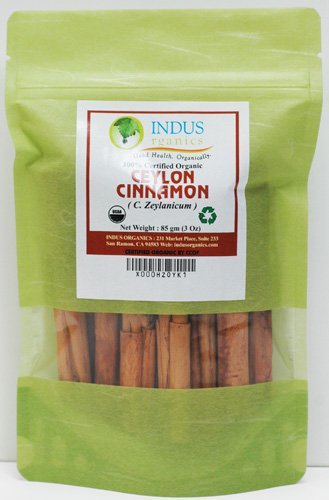All Categories





Indus Organic Real Ceylon Cinnamon 5" Sticks 3 Oz
Share Tweet








About Indus Organic Real Ceylon Cinnamon 5" Sticks 3 Oz
Our Real Ceylon Cinnamon is a very unique product. It is mild and sweet in taste. Our product is very different from Cassia sold as Cinnamon by most of the companies. Ceylon Cinnamon is used extensively in baking and cooking variety of dishes. Indus Ceylon Cinnamon is also used in casseroles, rice dishes, mulling wines, mulling apple cider and punches. It does not have very strong and spicy taste of Cassia. This Cinnamon is not available in most of the super markets. What is coumarin ? : (Text from wikipedia.com) Coumarin is moderately toxic to the liver and kidneys. Although only somewhat dangerous to humans, coumarin is a potent rodenticide. Germany has established a "tolerable daily intake" (TDI) of 0.1 mg coumarin per kg body weight, but also advises, [if] this level is exceeded for a short time only, there is no threat to health. For example, a person weighing 60 kg (about 132 lbs.) would have a TDI of approximately 6.0 mg of coumarin. Germany has warned against consuming high amounts of cassia bark, one of the four species of cinnamon, because of its coumarin content. According to the Germany, 1 kg of (cassia) cinnamon powder contains approximately 2.1 to 4.4 g of coumarin. Powdered Cassia Cinnamon weighs 0.56 g/cc; therefore, 1 kg of Cassia Cinnamon powder is equal to 362.29 teaspoons (1000 g divided by 0.56 g/cc multiplied by 0.20288 tsp/cc).This means 1 teaspoon of cinnamon powder contains 5.8 to 12.1 mg of coumarin, which may be above the Tolerable Daily Intake for smaller individuals. However, it is important to note that the Germany has only cautions against high daily intakes of foods containing coumarin. Coumarin is often found in tobacco and artificial vanilla substitutes. Coumarin was banned as a food additive in the United States in 1954.Coumarin was banned as an adulterant in cigarettes by tobacco companies in 1997.Coumarin is currently listed by FDA among "Substances Generally Prohibited From Direct Addition or Use as Human Food".


















